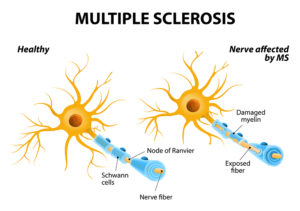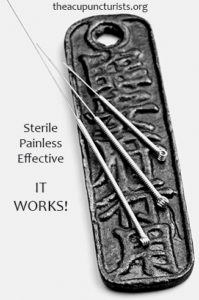 According to The Multiple Sclerosis Foundation, there are over 400,000 people suffering from this condition in the United States. When you look at the global chart, the figures rises to 2.5 million. While Multiple Sclerosis, or MS, is not believed to be a genetic condition, there is a widespread feel among scientists that the disease actually has a genetic lean. The proof is in the 15% of MS patients who just happen to have a close relative suffering from the same condition.
According to The Multiple Sclerosis Foundation, there are over 400,000 people suffering from this condition in the United States. When you look at the global chart, the figures rises to 2.5 million. While Multiple Sclerosis, or MS, is not believed to be a genetic condition, there is a widespread feel among scientists that the disease actually has a genetic lean. The proof is in the 15% of MS patients who just happen to have a close relative suffering from the same condition.
Defining Multiple Sclerosis
This is a highly unpredictable condition that affects the Central Nervous System (CNS). In most cases, this disease is highly disabling and takes a massive toll on the patient (J Neurosci Nurs, 1993). MS affects the coordination and flow of constructive information between the various parts of the brain as well as between the brain and body in general.
The good news that we’d like to report is that MS is treatable with holistic medicine. Patients that we have treated over the years have responded well to acupuncture, Chinese herbal medicine, and nutritional guidance to halt, and in some cases, reverse the symptoms of MS. Let’s explore some of the causes, symptoms and conventional treatment of this disease before we talk about acupuncture for multiple sclerosis and how it works.
Common Causes and Symptoms of MS
 Cohen JA (2009) seems to side with pretty much everyone in the field when he argues that the causes of MS are unknown as of today. However, consistent research has actually let on that genetics contribute more to this condition than we have always thought. Environmentally-driven triggers are also considered part of the causative ensemble. The Nothern Latitudes are without a doubt some of the most affected areas, while places like Africa and Asia are far less prone, as attested to by Polman CH, Reingold SC, Banwell B, et al (2010).
Cohen JA (2009) seems to side with pretty much everyone in the field when he argues that the causes of MS are unknown as of today. However, consistent research has actually let on that genetics contribute more to this condition than we have always thought. Environmentally-driven triggers are also considered part of the causative ensemble. The Nothern Latitudes are without a doubt some of the most affected areas, while places like Africa and Asia are far less prone, as attested to by Polman CH, Reingold SC, Banwell B, et al (2010).
The symptoms of MS include;
- Problems with eyesight
- Bladder and bowels issues
- Anxiety that develops into depression or even worse
- Problems with swallowing as well as forming words
- Complications relating to coordination, planning and learning
- Difficulty in movement
- Stiffness, pain and muscle spasms.
It would be instructive to note that not all patients experience MS the same way, and that the severity (or even presence) of the above symptoms varies from one patient to the next. Britain’s National Health Services (NHS) is particularly keen on making that point.
Western Medical Treatments for Multiple Sclerosis
The Mayo Clinic starts by declaring that there is no single cure for this disease. In the Western world, treatment approaches are aimed at making sure that symptoms are not severe, the disease does not progress, and that recovery from attacks is easy. If your signs are mild, then you need not worry about treatment (Manouchehrinia A, Constantinescu CS). Below are a few Western forms of relief:
- Plasmapheresis- In this process, your plasma is analyzed, isolating it from the red blood cells. The blood cells will eventually be mixed with the protein albumin and then pumped back into your body (Batocchi, AP; Evoli, A; Di Schino, C; Tonali, P 2000).
- Use of Corticosteroids – Solutions such as oral prednisone and intravenous methylprednisolone work toward the reduction of inflammation in nerve cells.
- Physical therapy – This form of therapy is built on making sure that the patient is mobile enough to manage independent actions. If coupled with mobility aids, it gets even better.
- Beta interferons – These are drugs injected just below the skin tissues in a bid to clamp down on the severity of relapses.
How acupuncture and Chinese Medicine effectively treats MS
 Chinese medicine ideally refers to approaches like acupuncture and herbal remedies. The strategy here is always holistic-the practitioners of the craft attempt at looking at the root cause of problems rather than simply glossing over the symptoms. The belief is that every patient out there has imbalances far beyond what Western medicine can see, and that is why there is always individualized attention. In the case of multiple sclerosis, acupuncturists see patients as suffering a lot more than the symptoms show, and that is why they go beyond the surface to establish the root. This belief actually aligns with scientific thought, which makes a powerful argument for MS being not one disease but a spectrum of disorders.
Chinese medicine ideally refers to approaches like acupuncture and herbal remedies. The strategy here is always holistic-the practitioners of the craft attempt at looking at the root cause of problems rather than simply glossing over the symptoms. The belief is that every patient out there has imbalances far beyond what Western medicine can see, and that is why there is always individualized attention. In the case of multiple sclerosis, acupuncturists see patients as suffering a lot more than the symptoms show, and that is why they go beyond the surface to establish the root. This belief actually aligns with scientific thought, which makes a powerful argument for MS being not one disease but a spectrum of disorders.
When trying to treat MS, acupuncturists will insert needles in areas that share common functional relationships such as meridians on the liver, spleen ad kidney. The needles are used to create a sense of balance and a positive flow of qi, which puts the patient on track for recovery.
When using acupuncture in MS, care needs to be taken in order to make sure that every patient has an approach tailored specifically for them. Jiang (2010) says that pulse and tongue diagnostic tests show that each specific MS patient has an underlying sense of disharmony that is removed from what we would expect for people suffering the same disease. Meaning that each patient presenting with MS symptoms may have a different pattern of disharmony, and that is why modalities such as acupuncture and Chinese medicine are so effective at treating this disease and other autoimmune disorders. Here is a look at the diagnosis of 3 different patients all presenting with a western medical diagnosis of Multiple Sclerosis;
- Kidney and Spleen qi and yin deficiency, which leads to turbid dampness
- Kidney and liver yin deficiency, which leads to interior liver wind
- Liver wind agitation inside the body
Jiang goes on to observe that patients who decide to go for treatment with both the Chinese herbs and acupuncture obtain relief much faster than those who choose to go in just one direction. There is a synergistic effect of the herbs and acupuncture working together to facilitate balance at a quicker pace.
Research studies that testify to the efficacy of acupuncture and TCM in MS
Jiang (2010) documents a comprehensive study of the efficacy of this remedy in treating patients. In a study that took in 20 students, the following results were obtained:
- First class recovery – 4 of the patients were completely treated effectively of MS within a few weeks of the experiment. Meaning complete reversal of symptoms. These patients were in the very early onset stage of this disease.
- Second class recovery – 8 of the patients experienced reduced pain and their condition stopped deteriorating, making it manageable.
- Third class recovery – acupuncturists managed to stabilize the patients, and even though they were significantly affected by the disease, the severity of the symptoms was mitigated. This happened in 5 patients.
- In the last 3 patients, there was no change in the state of their qi.
Larger studies also report the benefits of acupuncture for MS. A study conducted by the Washington Acupuncture Centre, 10,000 patients were treated and tracked for three years. The patients with MS significantly improved by 85 percent.
Abbate (2003) says that in some cases, the rates of recovery from MS are as high as 40% better than the prognoses made by doctors of the Western school of thought. In many cases, there is a sustained period of remission.
In a study of the side effects of acupuncture in Britain, professionals reported that only 671 cases of minor side effects were reported from a combined 10,000 sessions. In fact, only 9 complications were reported in a span of 20 years, according to Rabenstein and Shulman ( 2003).
If you’re suffering with Multiple Sclerosis and would like to try an effective, alternative approach to your care, give us a call today and schedule a free consultation. We have helped many with MS and we are confident that we can help you too.
References
- Abbate, S., 2003, “The Management of Multiple Sclerosis with the Extraordinary Vessels,” Acupuncture Today, v. 4, issue 12.
- Batocchi, AP; Evoli, A; Di Schino, C; Tonali, P (2000). “Therapeutic apheresis in myasthenia gravis”. Therapeutic Apheresis. 4 (4): 275–9.
- Cohen JA (July 2009). “Emerging therapies for relapsing multiple sclerosis”. Arch. Neurol. 66 (7): 821–8.
- Jiang, D., 2010, “Analysis of the Effectiveness of TCM Treatment of Multiple Sclerosis,” Journal of Chinese Medicine, no. 92, pp. 13-18.
- Manouchehrinia A, Constantinescu CS (October 2012). “Cost-effectiveness of disease-modifying therapies in multiple sclerosis”
- Polman CH, Reingold SC, Banwell B, et al. Diagnostic criteria for multiple sclerosis: 2010 revisions to the McDonald criteria. Ann Neurol. 2011;69(2):292-302. PMID: 21387374
- Rubin SM. Management of multiple sclerosis: an overview. Dis Mon. 2013;59(7):253-260. PMID:
- Rabinstein, A. and Schulman, L., 2003, “Acupuncture in Clinical Neurology,” The Neurologist, v. 9, pp. 137-148.
- http://www.nhs.uk/conditions/Multiple-sclerosis/Pages/Introduction.aspx
- http://www.nationalmssociety.org/What-is-MS
- https://www.ncbi.nlm.nih.gov/pubmed/8340639
- https://www.acufinder.com/Acupuncture+Information/Detail/Acupuncture+and+Multiple+Sclerosis
